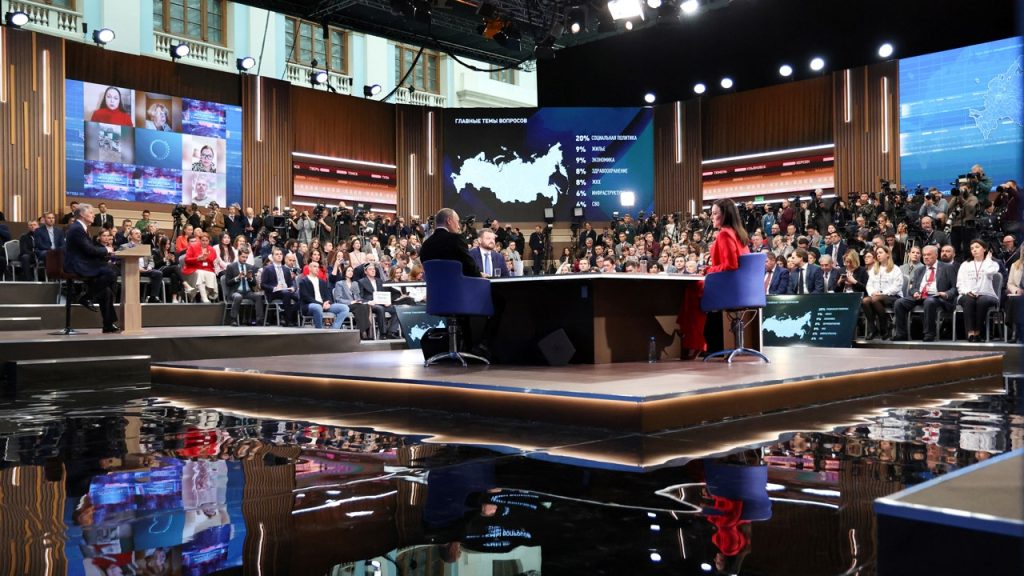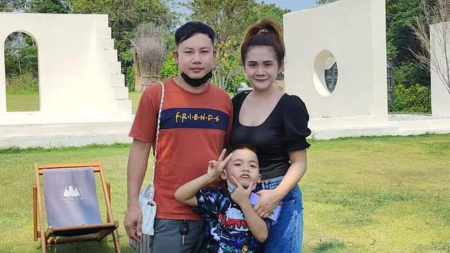Putin’s Overture for Compromise in Ukraine War: A Complex Web of Power, Strategy, and Uncertainty
Russian President Vladimir Putin, during his annual televised question-and-answer session, signaled a potential willingness to compromise on the ongoing war in Ukraine, contingent on discussions with then U.S. President-elect Donald Trump. This overture, delivered amidst a backdrop of escalating conflict and international sanctions, suggested a possible avenue for negotiation, albeit one laden with complexities and uncertainties. Putin’s remarks pointed to a desire to achieve a lasting peace agreement, rejecting the notion of a temporary truce, and emphasizing the need for Ukraine to abandon its NATO ambitions. While expressing readiness to negotiate with Ukrainian authorities, he stipulated that any agreement would require the involvement of what the Kremlin deemed "legitimate authorities," a definition that excluded then-President Volodymyr Zelenskyy unless re-elected. Putin’s stance underscored the deep political rift between the two nations, further complicated by the ongoing conflict and Russia’s territorial gains.
Putin’s emphasis on the need for "compromise" appeared to acknowledge the significant costs of the war, both for Russia and internationally. He asserted that Russia had become stronger since the invasion, but acknowledged the economic challenges posed by the conflict, including rising inflation. He also hinted at potential regrets, suggesting that he should have initiated the military operation earlier and that Russia should have been better prepared. These admissions, while seemingly minor, offered a rare glimpse into Putin’s assessment of the war’s impact and indicated a potential desire to find a resolution, albeit on terms favorable to Russia.
The proposed involvement of Donald Trump, a figure known for his self-proclaimed deal-making prowess, added another layer of intricacy to the situation. Putin’s assertion that he had not spoken to Trump in years raised questions about the feasibility of such a negotiation. Trump’s own public statements regarding the Ukraine conflict, while advocating for a swift end to hostilities, lacked specifics, leaving open questions about his potential approach and the extent to which he could influence the situation. However, the very suggestion of Trump’s involvement hinted at Putin’s perception of the former U.S. president as a potential mediator, possibly due to Trump’s prior rhetoric perceived as more accommodating towards Russia.
The backdrop of the war, marked by significant territorial gains by Russia and heavy casualties on both sides, added urgency to the question of a potential resolution. Putin’s assertion that Ukrainian forces were nearing exhaustion and that Russia was achieving its primary military objectives painted a picture of confidence, potentially aimed at strengthening his negotiating position. He dismissed the idea of a temporary truce, insisting on a long-lasting peace agreement based on the preliminary agreement reached in Istanbul early in the war, a deal that some Ukrainian politicians viewed as a capitulation. This unwavering stance suggested that any potential compromise would likely involve significant concessions from Ukraine.
The international response to the war, particularly the sanctions imposed by the U.S. and its allies, further complicated the dynamics of the conflict. These sanctions, aimed at pressuring Russia economically, created a high-stakes environment where any negotiation would need to address not only the territorial disputes and political tensions but also the economic ramifications of the conflict. Putin’s comments about the Russian economy’s overheating and inflation, while presented alongside claims of superior growth compared to some Western economies, hinted at the economic pressures facing Russia. This acknowledgement, coupled with his stated desire for a negotiated settlement, suggested that the economic consequences of the war were a factor in his willingness to consider compromise.
Adding to the complexity was the ongoing military situation, with Russia making steady advances in eastern Ukraine, threatening strategically important cities. Putin’s acknowledgement of the complexity of the fighting and his reticence to predict future developments underlined the fluidity of the situation. While expressing confidence in Russia’s eventual victory, his remarks also betrayed a recognition of the challenges still ahead. This blend of confidence and caution further emphasized the delicate balance of power and the uncertainties surrounding any potential negotiations.
Putin’s comments on the continued presence of Ukrainian forces in Russia’s Kursk region, along with his assertion that they would eventually be expelled, served as a reminder of the ongoing cross-border tensions and the potential for further escalation. His refusal to specify a timeline for the expulsion of Ukrainian forces indicated a strategic ambiguity, possibly intended to keep Kyiv off balance. This ongoing border conflict added another layer of complexity to any potential negotiations, highlighting the need for a comprehensive agreement that addressed not only the territorial disputes in Ukraine but also the wider security concerns of both Russia and Ukraine.
Finally, Putin’s reflections on his leadership and Russia’s role on the global stage provided insight into his worldview and strategic priorities. His assertion that he had fulfilled Boris Yeltsin’s request to “look after Russia” reflected his view of himself as a guardian of Russian sovereignty and a key player in international affairs. His comments on Russian military bases in Syria and the "invincibility" of Russian hypersonic missiles showcased his focus on maintaining Russian influence in key strategic regions and demonstrating military strength. These assertions, coupled with his remarks about the Ukraine war, underscored the multi-faceted nature of the challenges facing the international community and the complex calculations driving Putin’s actions. The juxtaposition of his willingness to consider compromise on Ukraine with his assertive stance on other geopolitical issues painted a portrait of a leader navigating a complex web of power, strategy, and uncertainty.










